Find Help
More Items From Ergsy search
-
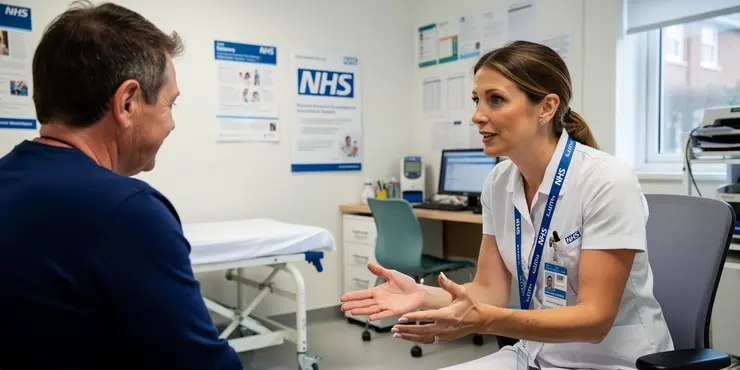
Treating anxiety and depression - www.slam.nhs.uk
Relevance: 100%
-
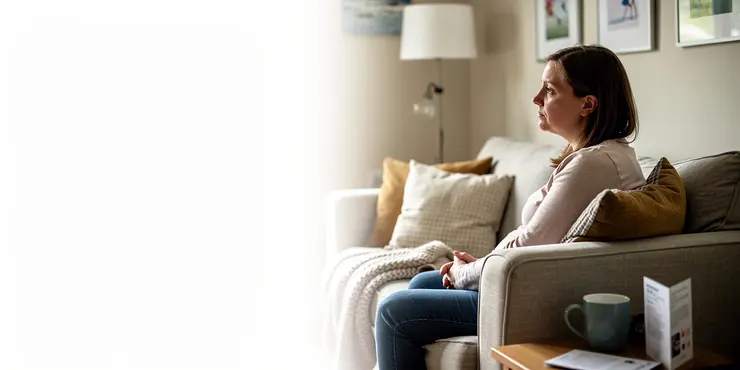
What are the symptoms of postnatal depression?
Relevance: 63%
-
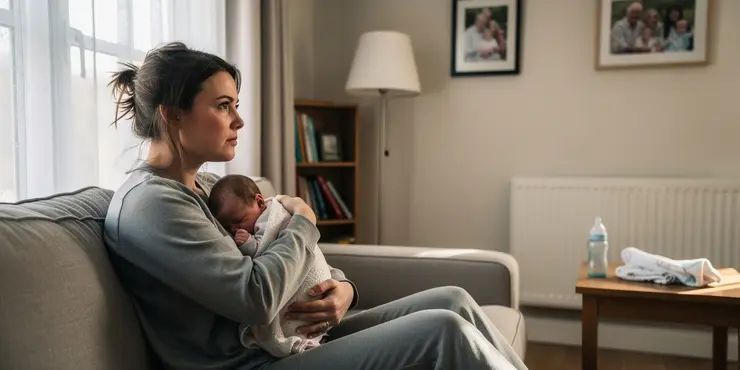
What is postnatal depression?
Relevance: 62%
-

Is postnatal depression preventable?
Relevance: 62%
-
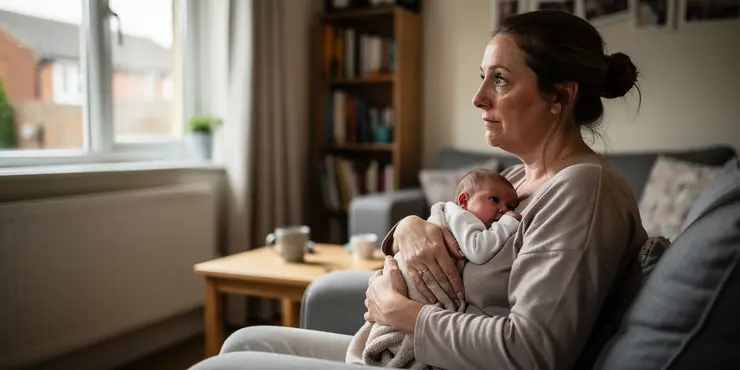
What causes postnatal depression?
Relevance: 61%
-
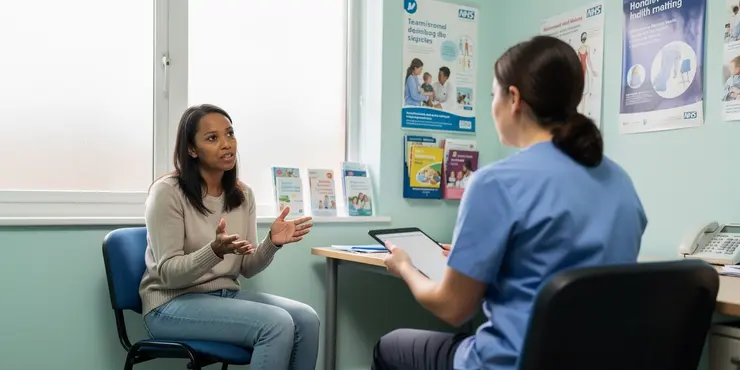
Can postnatal depression affect subsequent pregnancies?
Relevance: 60%
-
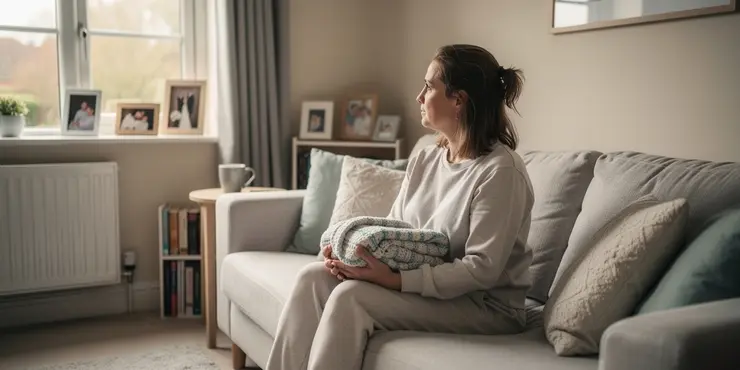
Postnatal Depression
Relevance: 60%
-
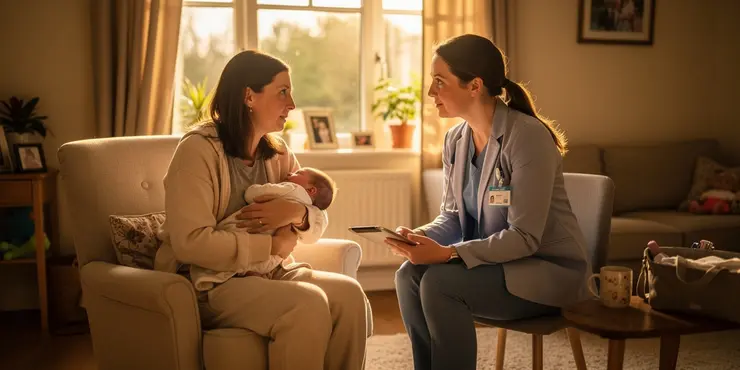
How is postnatal depression diagnosed?
Relevance: 59%
-
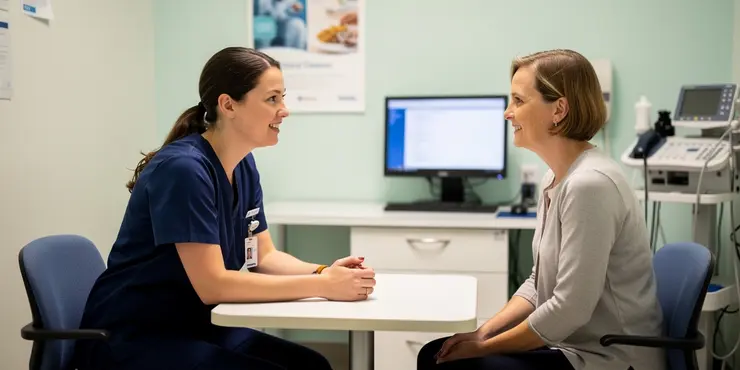
How can a relationship contribute to depression?
Relevance: 58%
-
Is health-related anxiety a common condition?
Relevance: 58%
-
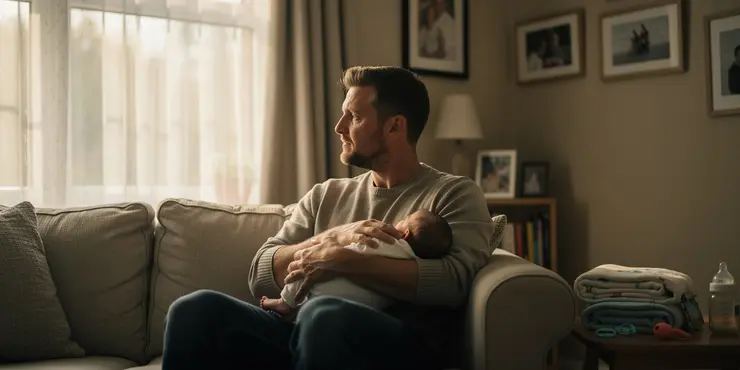
Can fathers experience postnatal depression?
Relevance: 57%
-
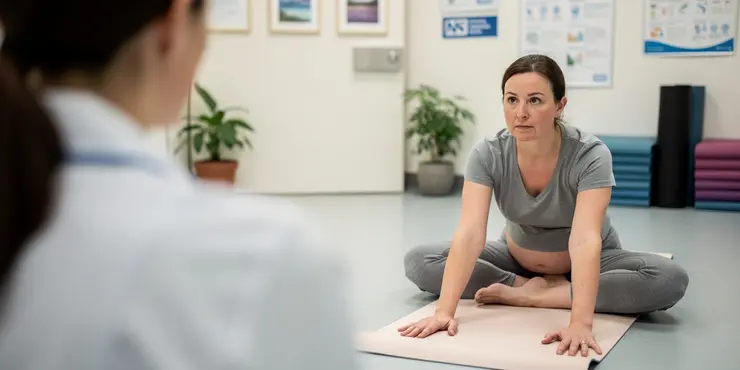
Can lifestyle changes help with postnatal depression?
Relevance: 56%
-
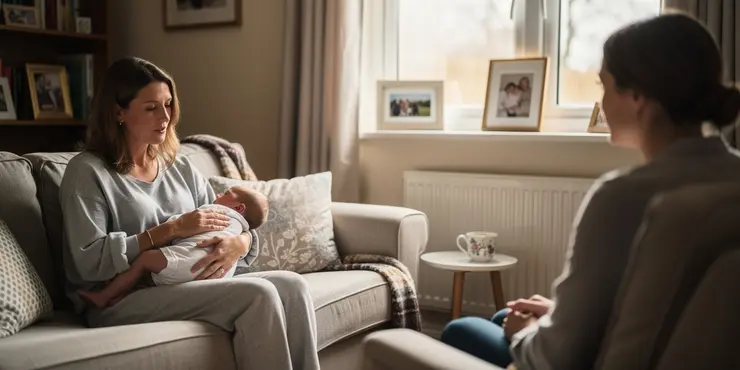
Are there support groups for postnatal depression?
Relevance: 55%
-
Is postnatal depression a long-term condition?
Relevance: 55%
-

How is postnatal depression different from the 'baby blues'?
Relevance: 55%
-
Postnatal Depression - Leanne's Story
Relevance: 55%
-
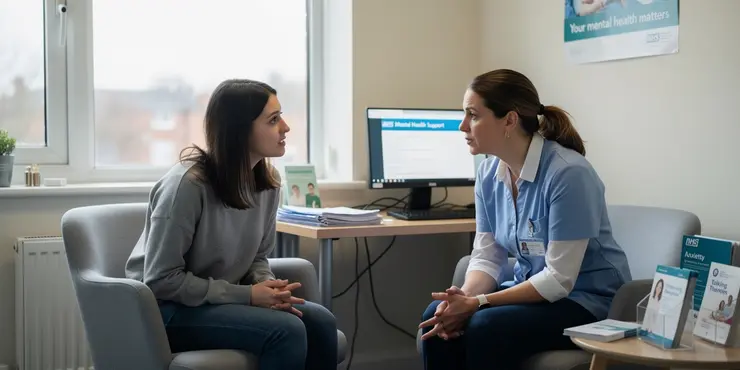
Anxiety | NHS
Relevance: 55%
-
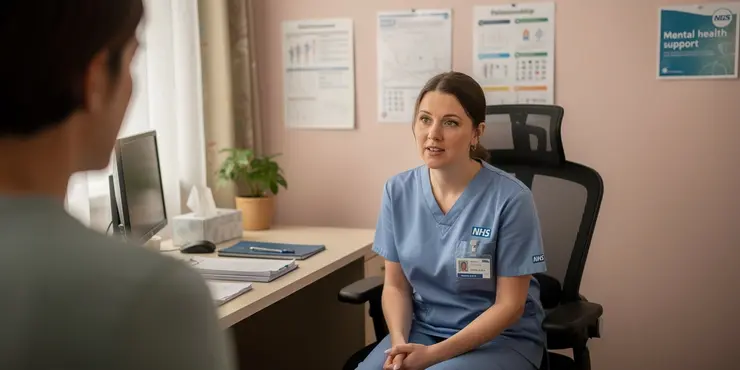
Can physical symptoms be linked to relationship-induced depression?
Relevance: 54%
-
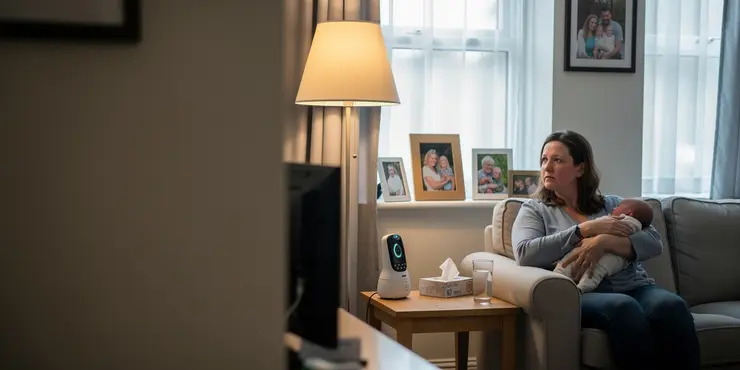
Is medication necessary for treating postnatal depression?
Relevance: 54%
-
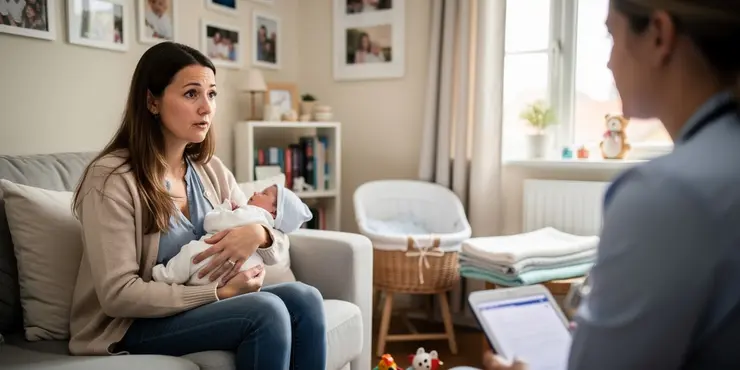
Are there treatments available for postnatal depression?
Relevance: 54%
-
What is health-related anxiety?
Relevance: 54%
-
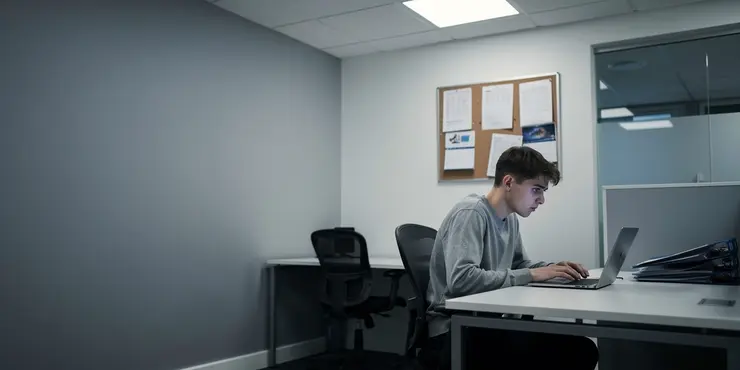
Anxiety in young people
Relevance: 54%
-
How is health-related anxiety different from general anxiety?
Relevance: 54%
-
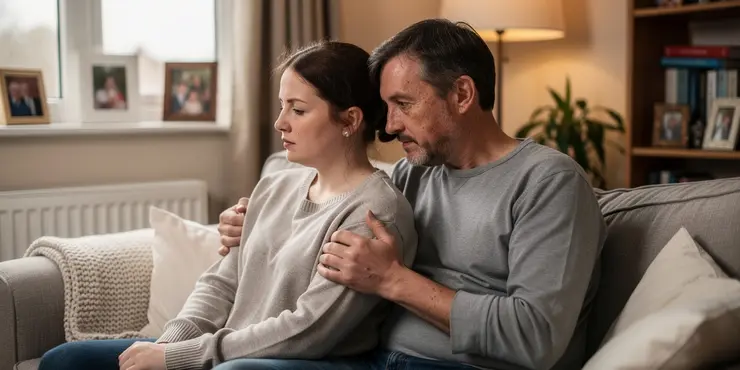
What are the signs that my relationship is making me depressed?
Relevance: 53%
-
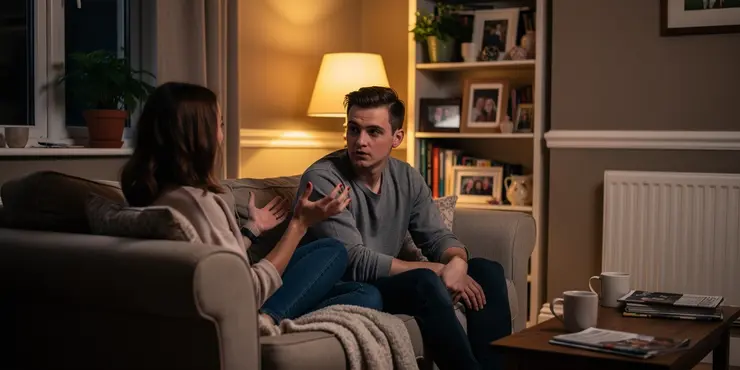
7 Signs Your Relationship is Making You Depressed
Relevance: 53%
-
Can postnatal depression recur after treatment?
Relevance: 52%
-

Can diet impact postnatal depression?
Relevance: 52%
-
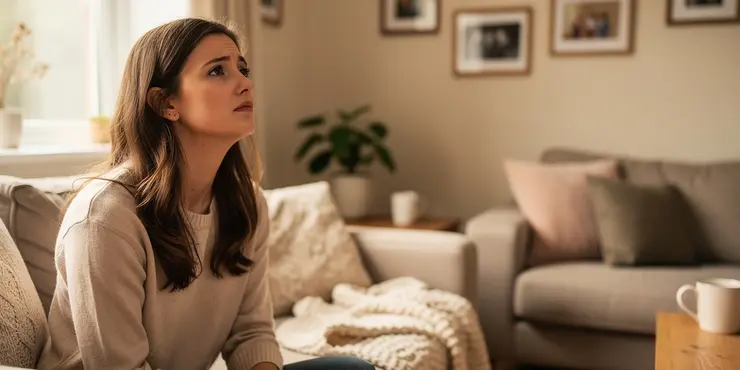
Coping with Stress and Anxiety
Relevance: 51%
-
Can health-related anxiety lead to actual health problems?
Relevance: 50%
-
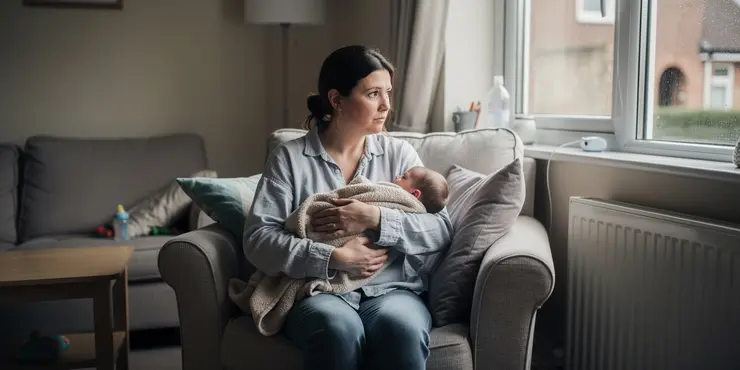
Should someone with postnatal depression seek professional help?
Relevance: 50%
-
What is health related anxiety?
Relevance: 50%
-
What causes health-related anxiety?
Relevance: 49%
-
What are common symptoms of health-related anxiety?
Relevance: 49%
-
How is health-related anxiety diagnosed?
Relevance: 49%
-
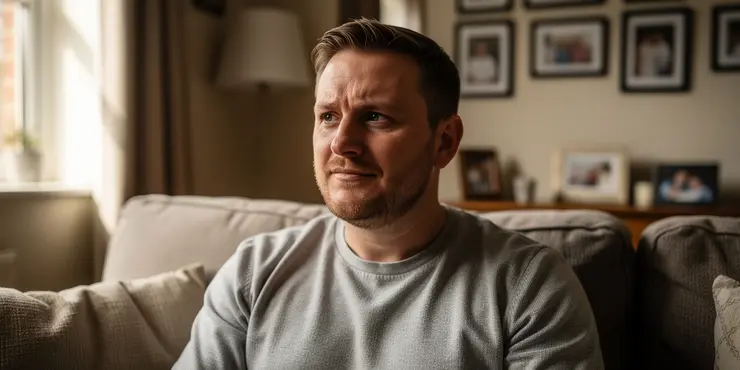
Clinical depression: Lawrence's story | NHS
Relevance: 49%
-

How does postnatal depression affect bonding with the baby?
Relevance: 49%
-
Is medication effective for health-related anxiety?
Relevance: 48%
-
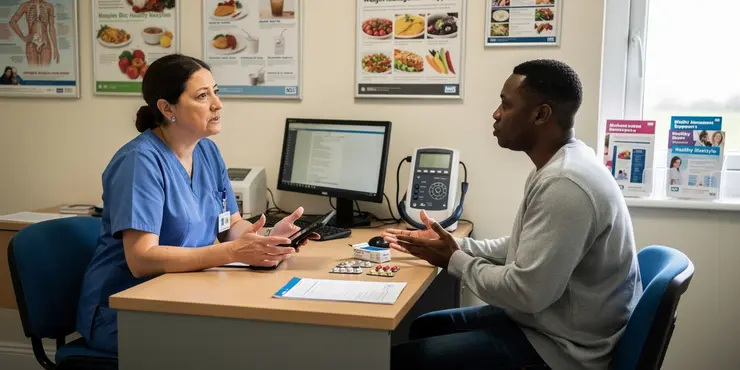
Can weight loss drugs lead to mood changes or anxiety?
Relevance: 48%
-
Is it possible to fully recover from health-related anxiety?
Relevance: 48%
-
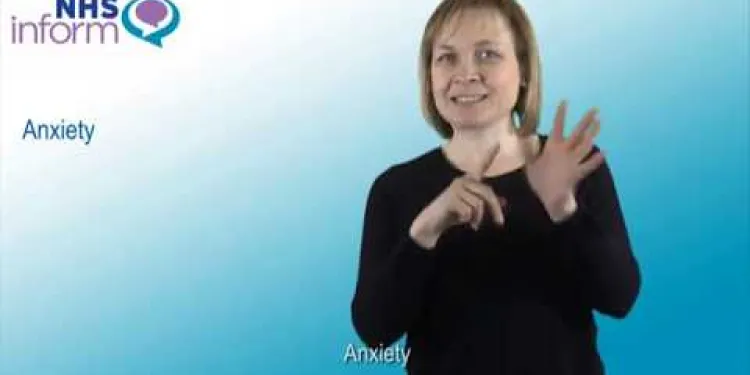
Generalised anxiety disorder (GAD)
Relevance: 47%
Treating Anxiety and Depression - SLaM NHS
Understanding Anxiety and Depression
Anxiety and depression are common mental health conditions affecting millions in the UK. Anxiety involves persistent, excessive worries, while depression is characterized by prolonged feelings of sadness and loss of interest in activities. South London and Maudsley NHS Foundation Trust (SLaM) provides comprehensive resources and treatments for managing these conditions.
Available Treatments
SLaM offers a variety of evidence-based treatments tailored to individual needs. These include:
- Therapy: Cognitive Behavioural Therapy (CBT), counselling, and psychotherapy are effective in understanding and changing negative thought patterns.
- Medication: Antidepressants and anxiolytics prescribed by healthcare professionals can help manage symptoms.
- Group Support: Support groups provide a platform to share experiences and receive mutual support.
Accessing Support from SLaM
If you are struggling with anxiety or depression, you can access help through your GP, who can refer you to SLaM services. Additionally, SLaM provides self-referral options for specific therapies. Comprehensive information is available on the SLaM NHS website, ensuring you find the right support promptly.
Self-Help and Lifestyle Changes
In addition to professional treatments, self-help strategies such as regular exercise, healthy eating, mindfulness, and adequate sleep can significantly improve mental health. SLaM also offers online resources and self-help materials to guide you in making these positive lifestyle changes.
Conclusion
Addressing anxiety and depression is crucial for mental well-being. With the extensive support and resources available from SLaM NHS, residents in the UK can access the necessary care to enhance their quality of life.
Treating Anxiety and Depression
Understanding Anxiety and Depression
Anxiety and depression are common mental health conditions that can significantly impact an individual's quality of life. Recognising the signs and symptoms is the first step toward receiving proper treatment. Anxiety often manifests as persistent worry, restlessness, and physical symptoms such as increased heart rate. Depression, on the other hand, can present as prolonged sadness, loss of interest in daily activities, and changes in appetite or sleep patterns.
Accessing NHS Services
In the United Kingdom, the National Health Service (NHS) provides various resources and services for individuals experiencing anxiety and depression. South London and Maudsley NHS Foundation Trust (www.slam.nhs.uk) is one of the key providers of mental health services. They offer a range of treatments including talking therapies, medication, and community support services. Referral to these services can be made by a GP or through self-referral in some cases.
Therapeutic Options
Several therapeutic options are available for treating anxiety and depression, including cognitive behavioural therapy (CBT), counselling, and psychotherapy. CBT is particularly effective as it helps patients change negative thought patterns and behaviours associated with anxiety and depression. In addition to individual therapy, group therapy sessions are also available, providing support through shared experiences.
Medication Treatments
In certain cases, medication may be prescribed to help manage symptoms of anxiety and depression. Antidepressants such as selective serotonin reuptake inhibitors (SSRIs) are commonly used. It is essential to consult with a healthcare professional to determine the most appropriate medication and dosage. Regular follow-ups are necessary to monitor progress and make any needed adjustments.
Complementary and Self-Help Strategies
Alongside professional treatment, various self-help strategies can be beneficial. Mindfulness, exercise, and establishing a routine can help improve mental health. Engaging in hobbies, maintaining social connections, and following a balanced diet are also important. The NHS website offers numerous resources and self-help guides that can support these efforts.
Seeking Immediate Help
If you or someone you know is in crisis, it is crucial to seek immediate assistance. The NHS offers 24/7 mental health helplines and emergency services. In the event of a mental health emergency, calling 999 or visiting the nearest A&E department is recommended.
Conclusion
Treating anxiety and depression involves a combination of professional medical care, therapeutic interventions, and self-help strategies. Using resources such as those provided by South London and Maudsley NHS Foundation Trust, individuals can access comprehensive support tailored to their needs. Early intervention and consistent care can significantly improve outcomes and enhance overall well-being.
Treating Anxiety and Depression - SLaM NHS
Understanding Anxiety and Depression
Anxiety and depression are feelings that many people in the UK experience. Anxiety means you worry too much, while depression makes you feel sad for a long time and lose interest in things you liked before. The South London and Maudsley NHS Foundation Trust (SLaM) can help people with these feelings by offering lots of different treatments.
Available Treatments
SLaM has different types of treatments to help everyone in a way that works best for them. These are:
- Therapy: Talking treatments like Cognitive Behavioural Therapy (CBT) help you learn to think differently and cope better.
- Medication: Doctors can give you medicine, like antidepressants, to help with your feelings.
- Group Support: Joining groups where you can share your experiences and get support from others.
Accessing Support from SLaM
If you feel anxious or depressed, you can talk to your doctor. They can help you get in touch with SLaM services. You can also contact SLaM directly for some therapies. There’s lots of helpful information on the SLaM NHS website.
Self-Help and Lifestyle Changes
Besides treatments, you can try doing things yourself to feel better. Exercise regularly, eat healthy, practice calming exercises like mindfulness, and get enough sleep. SLaM provides online tips and materials to help you make these changes.
Conclusion
It is important to address anxiety and depression for your mental health. SLaM NHS offers support and resources that help people in the UK feel better and enjoy life more.
Treating Anxiety and Depression
Understanding Anxiety and Depression
Anxiety and depression are common problems with how we feel. They can make life very hard. To get better, we need to notice the signs. Anxiety can make you feel worried, restless, and your heart might beat fast. Depression can make you feel very sad for a long time, make you lose interest in things, and change how you eat or sleep.
Accessing NHS Services
In the UK, the National Health Service (NHS) can help people with anxiety and depression. South London and Maudsley NHS Foundation Trust (www.slam.nhs.uk) provides mental health services. They offer talking therapies, medicine, and support. Your doctor can help you get these services, or you can sometimes ask for them yourself.
Therapeutic Options
There are different ways to help anxiety and depression. You can try talking therapies like cognitive behavioural therapy (CBT), counselling, or psychotherapy. CBT helps you change negative thoughts and actions. Group therapy is also there, where you can talk with others who feel the same.
Medication Treatments
Sometimes, medicine can help with anxiety and depression. Medicines like antidepressants (called SSRIs) are often used. It’s important to talk to a doctor to find the right medicine and how much to take. You need to see the doctor often to see how you are doing and make changes if needed.
Complementary and Self-Help Strategies
Besides professional help, doing things on your own can also help. Being mindful, exercising, and having a daily routine can improve your feelings. It's good to have hobbies, keep in touch with friends, and eat well. The NHS website has many guides and tips to help you with this.
Seeking Immediate Help
If you or someone you know needs urgent help, it is important to reach out quickly. The NHS has mental health helplines you can call anytime. If there is an emergency, call 999 or go to the nearest hospital A&E.
Conclusion
To treat anxiety and depression, you need medical care, therapy, and self-help actions. Using services like those from South London and Maudsley NHS Foundation Trust can give you the help you need. Getting help early and sticking with it can make you feel much better and improve your life.
Frequently Asked Questions
What are the common signs of anxiety?
Common signs of anxiety include persistent worry, restlessness, difficulty concentrating, muscle tension, sleep disturbances, and rapid heart rate.
What are the symptoms of depression?
Symptoms of depression include persistent sadness, loss of interest in activities, changes in appetite and sleep, fatigue, feelings of worthlessness or guilt, and thoughts of self-harm or suicide.
What treatments are available for anxiety in the UK?
Treatments for anxiety include cognitive behavioural therapy (CBT), medication such as selective serotonin reuptake inhibitors (SSRIs), lifestyle changes, and self-help strategies.
How can I get help for depression through the NHS?
You can start by visiting your GP, who can assess your symptoms and recommend treatment options such as therapy, medication, or referrals to specialist services.
Are there online resources available for treating anxiety and depression?
Yes, there are many online resources available such as NHS-approved apps, online therapy programs, and self-help materials specifically aimed at managing anxiety and depression.
Can lifestyle changes help with anxiety and depression?
Yes, lifestyle changes like regular exercise, a balanced diet, sufficient sleep, and stress management techniques can significantly improve symptoms of anxiety and depression.
What is cognitive behavioural therapy (CBT)?
Cognitive behavioural therapy (CBT) is a structured, time-limited therapy that helps individuals identify and change negative thought patterns and behaviours that contribute to anxiety and depression.
How long does it usually take for antidepressants to work?
Antidepressants typically take several weeks (usually 4 to 6 weeks) to start showing their full effects, though some individuals might start feeling better sooner.
Are there any support groups for anxiety and depression in the UK?
Yes, there are many support groups available both in-person and online. Organisations like Mind, Anxiety UK, and Depression UK offer support groups for individuals dealing with these conditions.
What can I do if I am in crisis and need immediate help?
If you are in crisis, you should contact emergency services by dialing 999, go to A&E, or contact Samaritans at 116 123 for immediate support.
Can children and adolescents receive treatment for anxiety and depression?
Yes, children and adolescents can receive treatment, often through CAMHS (Child and Adolescent Mental Health Services), which offers assessment, therapy, and support.
What should I do if my symptoms of anxiety or depression return after treatment?
If symptoms return, it's important to reach out to your GP or mental health professional to discuss your condition and possibly adjust your treatment plan.
Is it possible to manage anxiety and depression without medication?
Yes, many people manage their symptoms through therapy, lifestyle changes, stress management techniques, and self-help strategies without the need for medication.
Are there any risks associated with taking medication for anxiety and depression?
All medications have potential side effects. It's important to discuss these with your GP or psychiatrist to understand the risks and benefits and to monitor any adverse effects.
How can I help a loved one who is struggling with anxiety or depression?
Offer support by listening without judgment, encouraging them to seek professional help, being patient, and helping them find resources or support groups. Avoid offering simplistic solutions.
What is anxiety and depression?
Anxiety and depression are common mental health conditions. Anxiety often involves persistent worry or fear, while depression is characterized by prolonged feelings of sadness and loss of interest.
What causes anxiety and depression?
The causes can be a combination of genetic, biological, environmental, and psychological factors. Life events, stress, and trauma can also contribute to these conditions.
What are the common symptoms of anxiety?
Common symptoms include excessive worry, restlessness, fatigue, difficulty concentrating, irritability, muscle tension, and sleep disturbances.
What are the common symptoms of depression?
Symptoms often include persistent sadness, lack of interest or pleasure in activities, changes in appetite or weight, sleep problems, loss of energy, feelings of worthlessness or guilt, and thoughts of death or suicide.
How is anxiety diagnosed?
A healthcare professional, such as a GP or psychiatrist, will assess your symptoms through interviews, questionnaires, and sometimes physical exams to rule out other conditions.
How is depression diagnosed?
A diagnosis is typically made through a clinical assessment by a GP or mental health professional. They may use standardized screening tools to evaluate the severity and duration of depressive symptoms.
What treatments are available for anxiety and depression?
Treatments include psychological therapies like cognitive behavioural therapy (CBT), medications such as antidepressants, and lifestyle changes. Sometimes a combination of treatments is most effective.
What is Cognitive Behavioural Therapy (CBT)?
CBT is a type of talking therapy that helps you manage problems by changing the way you think and behave. It is commonly used to treat anxiety and depression.
Can medication help with anxiety and depression?
Yes, medications such as antidepressants can be effective for many people. It is important to discuss this with your doctor to find the right medication and dosage.
Are there lifestyle changes that can help with anxiety and depression?
Yes, regular exercise, a healthy diet, adequate sleep, and reducing stress can all contribute to better mental health. Mindfulness and relaxation techniques can also be beneficial.
Can anxiety and depression be cured?
While there may not be a 'cure,' many people successfully manage their symptoms with the right treatment and support, leading to significant improvements in quality of life.
Where can I get help for anxiety and depression in the UK?
You can start by visiting your GP, who can refer you to mental health services. You can also contact organizations such as the NHS, Mind, or Samaritans for support.
Is there a waiting list for mental health services in the UK?
Unfortunately, there can be waiting lists for certain mental health services. It is important to reach out to your healthcare provider to discuss options and support while you wait.
What should I do in a mental health emergency?
In an emergency, if you or someone else is in immediate danger, call 999. For urgent help, you can go to your nearest A&E department. You can also contact crisis helplines like Samaritans at 116 123.
How can family and friends support someone with anxiety and depression?
Being patient, listening without judgment, encouraging them to seek professional help, and providing practical support can all be incredibly helpful. Educate yourself about the conditions to better understand what they are going through.
What are the common signs of anxiety?
Feeling anxious is when you feel worried or scared. Here are some things you might notice:
- Your heart beats very fast.
- You breathe quickly.
- Your tummy feels funny.
- You sweat a lot, even if it's not hot.
- Your muscles feel tight.
- You feel shaky.
If you feel like this a lot, tell a trusted adult, like a parent or teacher. They can help you feel better. Playing calm music or taking slow, deep breaths can also help you relax.
When you feel worried a lot, it might be anxiety. Here are some signs:
- You worry all the time.
- You can't sit still.
- You find it hard to focus on things.
- Your muscles feel tight.
- You have trouble sleeping.
- Your heart beats very fast.
If you feel like this, talking to a grown-up or a doctor can help. Drawing, deep breathing, or using apps for relaxation can also be useful.
What signs show someone might be sad for a long time?
When people feel very sad for many days, they might be depressed. Here are some things they might feel:
- They feel sad all the time.
- They have no energy.
- They don’t enjoy the things they used to like.
- They find it hard to focus or think clearly.
- They don’t feel like eating or they eat too much.
- They have trouble sleeping or they sleep a lot.
- They feel bad about themselves.
- They feel very worried or upset.
If you feel this way, you can talk to someone who can help, like a doctor or a friend. You can also try drawing your feelings, using apps to relax, or listening to calming music.
Signs of feeling really sad:
- Feeling sad all the time.
- No interest in fun things.
- Eating or sleeping a lot more or less.
- Feeling very tired.
- Feeling bad about yourself.
- Thinking about hurting yourself.
If you feel this way, talk to someone you trust. You can also try drawing, listening to music, or going for a walk to help.
What can help with feeling worried in the UK?
There are things that can help if you feel worried or scared a lot. Here are some things you can try:
- Talking Therapy: This means talking to someone who is trained to help. They can listen and give advice.
- Medicine: A doctor might give you medicine to help you feel better.
- Exercise: Doing things like walking, running, or playing can help you feel happier.
- Breathing Exercises: Taking slow, deep breaths can help you feel calm. You can learn to do this.
- Apps and Websites: There are phone apps and websites that can teach you ways to feel less worried.
Talk to an adult you trust or a doctor if you feel worried a lot. They can help you find what works best for you.
Treatments for feeling worried or scared can include talking to a therapist, taking medicine from a doctor, changing what you do every day, and using tips to help yourself feel better.
Getting Help for Feeling Sad with the NHS
If you feel sad and need help, the NHS can help you. Here is how:
1. **Talk to Your Doctor:** Go to your doctor, also called a GP. They can talk to you about how you feel.
2. **Get a Plan:** Your doctor might give you a plan to feel better. This could be talking to someone, taking medicine, or both.
3. **Use Talking Therapies:** You can speak to someone who listens and helps. This is called talking therapy.
4. **Call for Help:** If you need to talk to someone quickly, there are phone lines you can call for help.
If you find reading hard, ask someone to help you. Using pictures or a drawing can also help you understand better.
You can go see your doctor. They can check how you feel and suggest ways to help, like talking to a therapist, taking medicine, or seeing a special doctor.
Can I find help for anxiety and feeling sad online?
Yes, there are ways to get help on the internet. You can find information and tools that can help you feel better. It's important to talk to someone who can help, like a doctor or a counselor.
Here are some things you can use:
- Websites: Some websites give you tips and advice to manage your feelings.
- Apps: There are apps that can help you relax or remind you to do things that make you happy.
- Videos: You can watch videos of people talking about ways to feel better.
You are not alone, and help is out there for you.
Yes, there are lots of websites and apps online that can help. Some have the NHS's (National Health Service) approval. You can also find therapy online and books or guides to help with feeling worried or sad.
Can changing daily habits help with feeling worried or sad?
Some people feel worried or sad. Changing some things you do every day might help you feel better. Here are some tips:
- Get enough sleep.
- Eat healthy food.
- Exercise, like walking or playing outside.
- Talk to someone you trust, like a friend or family member.
- Try deep breathing or relaxing music to calm down.
Remember, doing these things can help. It's also good to talk to a doctor or a helper if you need more support.
Yes, doing things like exercise, eating healthy foods, getting enough sleep, and finding ways to relax can help you feel less worried and sad.
What is CBT?
CBT stands for Cognitive Behavioural Therapy. It helps people with their thoughts and feelings. It teaches new ways to think about things that make you upset or worried.
If you find this hard to read, you can ask someone to help you. You can also use a reading app to read it aloud to you.
CBT stands for cognitive behavioural therapy. It is a special kind of talking therapy. It helps people change bad thoughts and actions that make them feel sad or worried. CBT has a plan and does not last too long.
How long do antidepressants take to start working?
Antidepressants are medicines that help with feeling sad or worried.
It can take a few weeks before you start to feel better after taking them.
Most people notice a change in about 2 to 4 weeks.
Here are some tips to help:
- Talk to your doctor about how you feel.
- Write down how you feel each day.
- Ask a friend or family member to help you remember to take your medicine.
Antidepressant medicines usually take a bit of time to work. Most of the time, it takes about 4 to 6 weeks to feel much better. Some people might feel a little better sooner.
Can I find support groups for feeling worried or sad in the UK?
Do you sometimes feel very worried or very sad?
If you do, there are groups in the UK that can help you. These are places where you can talk to other people who understand how you feel.
You can ask a grown-up or someone you trust to help you find one of these groups.
It might also be helpful to talk to a doctor or a counselor for more support.
Yes, there are many groups that can help you. You can go to them in person or talk online. Groups like Mind, Anxiety UK, and Depression UK help people who feel very worried or sad.
What can I do if I need help right now?
If you feel very upset or in danger, you can get help by calling 999, or go to the hospital’s A&E for quick help. You can also call Samaritans at 116 123. They are there to talk and help you right away.
Can kids and teens get help for feeling worried or sad?
Yes, kids and teens can get help if they feel worried or sad. There are people called doctors and therapists who can talk to them and help them feel better. Talking to someone can make feeling worried or sad easier to handle.
It is good to tell an adult if you feel this way. Adults like parents, teachers, or school counselors can help you find someone to talk to.
There are also things like drawing, playing, or writing that can help you feel better. It is important to know you are not alone, and there are people who want to help you.
Yes, kids and teens can get help from CAMHS. This is a service for young people's mental health. They check how you are, give you therapy, and offer support.
If you need help, talk to a parent, teacher, or doctor. They can help you get in touch with CAMHS.
What can I do if I feel worried or sad again after getting help?
If you feel unwell again, talk to your doctor or mental health helper. They can help you feel better and might change your treatment to help you more.
Can you feel better from anxiety and depression without taking medicine?
Yes, you can try other ways to feel better. Here are some things that might help:
- Talk to someone you trust about your feelings.
- Try to do some exercise, like walking or playing a sport.
- Make sure you get enough sleep every night.
- Eat healthy foods like fruits and vegetables.
- Practice deep breathing or meditation to relax.
- Write down your thoughts and feelings in a journal.
- Ask for help from a counselor or support group.
If you try these and still feel bad, talk to a doctor or counselor. They can help you find the best way to feel better.
Yes, lots of people can feel better by doing things like talking to a counselor, changing their daily habits, learning to handle stress, and helping themselves. They do not always need medicine.
Can taking medicine for feeling worried or sad cause problems?
Taking medicine to help with worry and sadness can sometimes cause problems. It is important to talk with a doctor to know about these problems. Doctors can help find the right medicine and make sure it is safe.
If you have worries about the medicine, ask the doctor or a nurse. They can explain things clearly and help you feel better. It’s also good to talk with family or friends for support.
Here are some tips to help:
- Write down any questions you have before you see the doctor.
- Take notes when the doctor is talking to help you remember.
- Use pictures or drawings if they help you understand better.
All medicines can cause side effects. It's a good idea to talk to your doctor about these. They can help you understand the good and bad things about the medicine. They can also help you watch for any bad effects.
Helpful tip: Make a list of any questions you have about the medicine and take it to your doctor's appointment.
You might find it useful to keep a diary of how you feel after taking the medicine. This can help you tell your doctor if something doesn't feel right.
How can I help someone I love who is feeling sad or worried?
Here are ways to help someone you care about who feels sad or worried:
- Listen to them. Let them talk about how they feel.
- Be there for them. Spend time together.
- Encourage them to do things they enjoy. Play games or go for a walk.
- Talk to a doctor or counselor if they need extra help.
Remember, being kind and patient is important too.
Help your friend by listening to them. Do not judge them. Tell them it is okay to get help from a doctor or counselor. Be patient and give them time. You can help find books or groups that make them feel better. Do not try to give easy answers to big problems.
What is feeling worried and sad?
Lots of people feel worried or sad sometimes. This is normal.
When someone feels worried or sad for a long time, it might be more serious.
Feeling very worried is called anxiety. Feeling very sad is called depression.
If you feel this way, talking to a grown-up you trust can help. They can help you find a doctor or someone to talk to.
There are also apps and videos that can help you feel better. These tools can teach you ways to relax and feel happy again.
Anxiety and depression are types of mental health problems. Anxiety means you might feel worried or scared a lot of the time. Depression means you might feel very sad or lose interest in things you usually enjoy.
Why do people feel anxious and sad?
There are different reasons why people might feel worried or sad. Here are some:
- Big changes in life, like moving to a new place or starting a new school.
- Feeling lonely or not having friends to talk to.
- Problems at home, like fighting or not getting along.
- Wanting to be perfect and worrying too much.
- Getting sick or not feeling well.
Tools that can help include:
- Talking to a trusted friend or adult.
- Drawing or writing about your feelings.
- Doing something fun or relaxing, like playing outside or listening to music.
The causes can be a mix of different things. It can be because of genes, the body, where someone lives, or how they feel and think. Things that happen in life, feeling stressed, or going through something hard can also cause these conditions.
What are common signs of feeling worried?
Here are some signs you might notice:
- Worrying a lot
- Feeling restless or can't sit still
- Getting tired easily
- Finding it hard to focus or pay attention
- Feeling grumpy or easily annoyed
- Having tight or tense muscles
- Having trouble sleeping or not sleeping well
If you notice these signs, you can try some things to help:
- Take deep breaths to relax
- Do some stretches or gentle exercises
- Talk to someone you trust about how you feel
- Listen to calming music or sounds
- Make a bedtime routine to help you sleep better
What are the common signs of feeling very sad?
Feeling very sad is called depression. Here are some signs:
- Feeling sad most of the time.
- Not wanting to do things you usually like.
- Feeling tired or having no energy.
- Trouble sleeping, or sleeping too much.
- Find it hard to focus or make decisions.
- Changes in eating – eating too much or not enough.
- Feeling bad about yourself or blaming yourself a lot.
Remember, you can talk to a grown-up or a doctor if you feel this way. Writing in a diary or drawing can also help understand feelings.
Signs of feeling very sad can be:
- Feeling sad for a long time
- Not caring about things you used to like
- Eating more or less than usual
- Gaining or losing weight
- Having trouble sleeping
- Feeling very tired
- Thinking you are not good enough
- Feeling guilty
- Thinking a lot about dying or ending your life
It is important to talk to someone who can help, like a parent, teacher, or doctor. Using tools like drawings, talking to a friend, or simple apps can also help you feel better.
How do doctors find out if you have anxiety?
A doctor or a mental health doctor will talk to you and ask you questions to understand how you feel. They might give you forms to fill out and sometimes check your body to make sure nothing else is wrong. This helps them see what is happening and how they can help you.
How do doctors find out if someone is sad for a long time?
Doctors talk to the person and ask questions. They want to know how the person feels. They ask if the person feels sad most days, if they like doing fun things, and how they sleep and eat.
Doctors might also ask about changes at school, work, or home. It's important to share everything with the doctor.
Sometimes, doctors ask for some tests. These tests help them learn more about the person's health.
If you think you are feeling sad a lot, it is a good idea to tell a trusted adult. They can help you talk to a doctor.
Pictures, videos, and using a diary to write down feelings can help too.
Doctors decide what illness you have by talking to you and checking how you feel. They use special tests to find out how serious and how long your sad feelings have lasted.
What can help people feel better if they are sad or worried?
There are things that can help if someone feels very sad or worried. Here are some things that might help:
- Talking to a doctor or therapist: A doctor or therapist can listen and give advice.
- Medicine: A doctor might give medicine to help feel better.
- Exercise: Moving the body, like walking or playing, can help feel good.
- Talking to friends or family: Sharing feelings with someone who cares can be helpful.
- Relaxing: Doing things like deep breathing or listening to music can help calm down.
Each person is different, so it's important to find what works best for them. A doctor can help choose the right things to try. Remember, it’s okay to ask for help.
Treatments can help you feel better. These treatments include talking therapies like cognitive behavioural therapy (CBT), medicines like antidepressants, and changing some habits in your life. Sometimes, using more than one of these treatments works best.
What is Cognitive Behavioural Therapy (CBT)?
Cognitive Behavioural Therapy, or CBT, is a way to help people feel better by changing how they think and act.
It teaches people to notice and change unhelpful thoughts. This can help them feel less sad or worried.
CBT helps people solve problems by breaking them into smaller steps. This makes it easier to understand and handle problems.
CBT can be helpful for children and adults. It can be done by talking to a therapist or using online tools that guide you through activities.
Using pictures and simple words can make CBT easier to understand. An adult or a therapist can help explain each step.
CBT is a kind of talking help that teaches you to deal with problems. It changes how you think and act. People often use CBT to help with feeling worried or sad.
Can medicine help with feeling worried or sad?
Medicine can help when you feel very worried or very sad. These feelings are called anxiety (worried) and depression (sad). Doctors can give you medicine to feel better.
Medicine is like a tool. It can help your brain feel calm and happy again.
Sometimes, talking to someone you trust, like a doctor or a friend, can also help. They can help you find more ways to feel better.
It's important to talk to a doctor before taking any medicine. They know what is best for you.
Other things that might help are:
- Doing things you enjoy
- Getting enough sleep
- Eating healthy food
- Going for a walk or moving your body
Remember, it's okay to ask for help.
Yes, some medicines like antidepressants can help many people feel better. It is important to talk to your doctor to find the right medicine and how much you need to take.
Can changing how I live help me feel less worried or sad?
Yes, doing exercise often, eating good foods, sleeping well, and having less stress can help you feel happier. Doing things that help you relax and pay attention to how you feel can also help.
Can we make anxiety and depression go away?
There might not be a 'cure,' but lots of people get better with the right help. With good treatment and support, their lives can get much better.
Where can I find help for feeling worried or sad in the UK?
If you are feeling worried (anxious) or sad (depressed), there are places you can get help.
You can: - Talk to your doctor (GP). - Call a help line like Samaritans or Childline. - Visit a health center that helps with feelings. - Use online tools to help you feel better.
It is important to talk to someone if you feel worried or sad.
Start by talking to your doctor. Your doctor can help you get more support for your feelings. You can also call places like the NHS, Mind, or Samaritans if you need to talk to someone.
Do I have to wait for mental health help in the UK?
Sometimes, there might be a wait to get help for your feelings in the UK.
If you need help now, you can:
- Talk to a trusted adult, like a parent or teacher.
- Call a helpline. They can listen and help.
Remember, it's okay to ask for help!
Sometimes, you might have to wait for help with mental health. It is a good idea to talk to your doctor. They can tell you about other ways to get help while you wait.
What to Do in a Mental Health Emergency
If someone is very upset or not feeling well in their mind, it is called a mental health emergency. Here is what you can do:
- Stay calm and try to help them feel safe.
- Call for help. You can call a doctor, therapist, or emergency services for advice.
- Listen to them. Let them talk about how they feel.
- Stay with them if they need company, but make sure you are safe too.
- Use relaxing tools like breathing exercises to help them calm down.
Remember, it is important to get help from people who know what to do.
If there is an emergency and someone might get hurt right away, call 999. If help is needed fast, you can also go to the nearest hospital's A&E. You can talk to someone at a crisis helpline too. Call Samaritans at 116 123.
How can family and friends help someone with anxiety and depression?
Family and friends can help by being kind and listening. Here are some ways to help:
- Be there: Spend time with them. Let them know you care.
- Listen: Let them talk about their feelings. Listen without judging.
- Encourage: Remind them that it’s okay to ask for help from a doctor or therapist.
- Be patient: Understand that getting better takes time.
- Learn: Read books or look online to learn more about anxiety and depression.
If you want to help more, try these tools:
- Relaxation apps: Suggest using apps that help calm the mind.
- Support groups: Find local or online groups where they can meet others who understand.
Be patient and listen to them. Do not judge them. Encourage them to see a doctor or therapist. Help them with things they need. Learn about their condition to understand them better.
Useful Links
This website offers general information and is not a substitute for professional advice.
Always seek guidance from qualified professionals.
If you have any medical concerns or need urgent help, contact a healthcare professional or emergency services immediately.
Some of this content was generated with AI assistance. We’ve done our best to keep it accurate, helpful, and human-friendly.
- Ergsy carfully checks the information in the videos we provide here.
- Videos shown by Youtube after a video has completed, have NOT been reviewed by ERGSY.
- To view, click the arrow in centre of video.
- Most of the videos you find here will have subtitles and/or closed captions available.
- You may need to turn these on, and choose your preferred language.
- Go to the video you'd like to watch.
- If closed captions (CC) are available, settings will be visible on the bottom right of the video player.
- To turn on Captions, click settings .
- To turn off Captions, click settings again.
More Items From Ergsy search
-

Treating anxiety and depression - www.slam.nhs.uk
Relevance: 100%
-

What are the symptoms of postnatal depression?
Relevance: 63%
-

What is postnatal depression?
Relevance: 62%
-

Is postnatal depression preventable?
Relevance: 62%
-

What causes postnatal depression?
Relevance: 61%
-

Can postnatal depression affect subsequent pregnancies?
Relevance: 60%
-

Postnatal Depression
Relevance: 60%
-

How is postnatal depression diagnosed?
Relevance: 59%
-

How can a relationship contribute to depression?
Relevance: 58%
-
Is health-related anxiety a common condition?
Relevance: 58%
-

Can fathers experience postnatal depression?
Relevance: 57%
-

Can lifestyle changes help with postnatal depression?
Relevance: 56%
-

Are there support groups for postnatal depression?
Relevance: 55%
-
Is postnatal depression a long-term condition?
Relevance: 55%
-

How is postnatal depression different from the 'baby blues'?
Relevance: 55%
-
Postnatal Depression - Leanne's Story
Relevance: 55%
-

Anxiety | NHS
Relevance: 55%
-

Can physical symptoms be linked to relationship-induced depression?
Relevance: 54%
-

Is medication necessary for treating postnatal depression?
Relevance: 54%
-

Are there treatments available for postnatal depression?
Relevance: 54%
-
What is health-related anxiety?
Relevance: 54%
-

Anxiety in young people
Relevance: 54%
-
How is health-related anxiety different from general anxiety?
Relevance: 54%
-

What are the signs that my relationship is making me depressed?
Relevance: 53%
-

7 Signs Your Relationship is Making You Depressed
Relevance: 53%
-
Can postnatal depression recur after treatment?
Relevance: 52%
-

Can diet impact postnatal depression?
Relevance: 52%
-

Coping with Stress and Anxiety
Relevance: 51%
-
Can health-related anxiety lead to actual health problems?
Relevance: 50%
-

Should someone with postnatal depression seek professional help?
Relevance: 50%
-
What is health related anxiety?
Relevance: 50%
-
What causes health-related anxiety?
Relevance: 49%
-
What are common symptoms of health-related anxiety?
Relevance: 49%
-
How is health-related anxiety diagnosed?
Relevance: 49%
-

Clinical depression: Lawrence's story | NHS
Relevance: 49%
-

How does postnatal depression affect bonding with the baby?
Relevance: 49%
-
Is medication effective for health-related anxiety?
Relevance: 48%
-

Can weight loss drugs lead to mood changes or anxiety?
Relevance: 48%
-
Is it possible to fully recover from health-related anxiety?
Relevance: 48%
-

Generalised anxiety disorder (GAD)
Relevance: 47%


